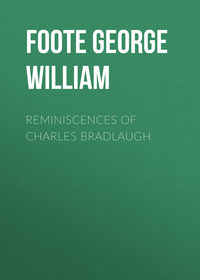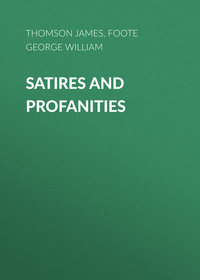 полная версия
полная версияFlowers of Freethought (First Series)
Nor are these questions exhaustive. Very much remains to be said. It appears that the Norwood bridge collapsed through a secret flaw in the ironwork. Could not the Lord, therefore, in answer to Hargraves' prayers – which surely extended to the interests of his employers – have inspired one of the Company's engineers with the notion of some unsoundness in the structure? This would have saved a good deal of property, and many passengers from suffering a shock whose effects may haunt them for years, and perhaps send them to untimely graves? Might not the Lord have cleared the roadway below, knocked down the bridge in the night, and brought some one to see the collapse who could have carried the tidings to the signalmen? Certainly there seems a remarkable want of subtlety in the ways of Providence. It looks as though the Deity heard a prayer now and then, and jerked out a bit of miracle in a more or less promiscuous manner.
What has happened to Providence since the Bible days? Miracles then were clear, convincing, and artistically rounded. You could not possibly mistake them for anything else. Baalam's ass, for instance, was not a performing "moke"; it does not appear to have known a single trick; and when it opened its mouth and talked in good Moabitish, the miracle was certain and triumphant. In the same way, the Norwood miracle might have been unadultterated with the usual operations of nature. The bridge might have collapsed as the train approached, driver Hargraves might have said his prayer, the train might have leapt across the chasm, picked up the connection on the other side, and pursued its way to Brighton as if nothing had happened. But as the case stands, Providence and the safety-brake act together, and it is difficult to decide their shares in the enterprise. Further, the miracle is sadly mixed. Any human being would have planned it better, and made it stand out clearly and firmly.
This Norwood miracle, however, seems the best obtainable in these days. It is a minute return for all the prayers of the clergy, to say nothing of pious engine-drivers; a miserable dividend on the gigantic investment in supernaturalism. We pity the poor shareholders, though we must congratulate the directors on the large salaries they draw from the business. We also pity poor old Providence, who seems almost played out. Once upon a time he was in fine form; miracles were as common as blackberries; Nature seldom got an innings, and Jehovah was all over the field. But nowadays Nature seems to have got the better of him. She scarcely leaves him a corner for his operations, and what little he does (if he does anything) has to be done in obscurity. Poor old Providence, we fancy, has had his day. His vigor is gone, his lively fancy has degenerated into moping ineptitude, the shouts of millions of worshippers cannot stimulate his sluggishness into any more effective display than this Norwood miracle. Most sincerely we offer him our condolence as the sleeping partner in the business of religion. By and bye we may offer our condolence to the active partners, the priests of all denominations, who still flourish on a prospectus which, if once true, is now clearly fraudulent. When their business dwindles, in consequence of a failing supply of good supernatural articles, they will only live on the price of actual deliveries, and a Norwood miracle will hardly afford six of them a mouthful apiece.
JESUS ON WOMEN
"For religions," says Michelet, "woman is mother, tender guardian, and faithful nurse. The gods are like men; they are reared, and they die, upon her bosom." Truer words were never uttered. Michelet showed in La Sorcière, from which this extract is taken, as well as in many other writings, that he fully understood the fulcrum of priestcraft and the secret of superstition. Women are everywhere the chief, and in some places the only, supporters of religion. Even in Paris, where Freethinkers abound, the women go to church and favor the priest. Naturally, they impress their own views on the children, for while the father's influence is fitful through his absence from home, the mother's is constant and therefore permanent. Again and again the clergy have restored their broken power by the hold upon that sex which men pretend to think the weaker, although they are obviously the sovereigns of every generation. Men may resolve to go where they please, but if they cannot take the women with them they will never make the journey. Women do not resist progress, they simply stand still, and by their real, though disguised, rule over the family, they keep the world with them. Freethinkers should look this fact in the face. Blinking it is futile. Whoever does that imitates the hunted ostrich, who does not escape his doom by hiding his head. The whole question lies in a nutshell. Where one sex is, the other will be; and there is a terrible, yet withal a beautiful, truth in the upshot of Mill's argument, that if men do not lift women up, women will drag men down. In the education and elevation of women, then, lies the great hope of the future. Leading Freethinkers have always seen this. Shelley's great cry, "Can man be free if woman be a slave?" is one witness, and Mill's great essay on The Subjection of Women is another.
Go where you will, you find the priests courting the women. They act thus, not because they despise men, or fear them, but because they (often unconsciously) feel that when they have captured the "weaker" sex, the other becomes a speedy prey. Perhaps a dim perception of this truth hovered in the minds of those who composed the story of the Fall. The serpent does not bother about Adam. He just makes sure of Eve, and she settles her "stronger" half. Milton makes Adam reluct and wrangle, but it is easy to see he will succumb to his wife's persuasions. He swears he won't eat, but Eve draws him all the time with a silken string, mightier than the biggest cable.
When the Christian monks were proselytising at Rome, they were hated, says Jortin, "as beggarly impostors and hungry Greeks who seduced ladies of fortune and quality." Hated, yes; but what did the hatred avail? The women were won, and the game was over. Men growled, but they had to yield. The same holds good to-day. Watch the congregations streaming out of church, count ten bonnets to one hat, and you might fancy Christianity played out because the men stay at home and neglect its ministrations. Nothing of the sort. Men may desert the churches as they like, but while the women go the clergy are safe. Examine the church and chapel organisations closely, and you will see how nine-tenths of everything is designed for women and children. Yes, the bonnet is the priest's talisman. Like Constantine's legendary cross, it bears the sign By this Conquer.
On the other hand, the clergy never fail to remind women that religion is their best friend. Without our doctrines and our holy Church, they say, there would be social chaos; the wild passions of men would spurn control, marriage would be despised, wives would become mistresses, homes would disappear, and children would be treated as encumbrances. There is not a grain of truth in this, for religion has fomented, countenanced, or cloaked, more sensuality and selfishness than it has ever repressed. But it is a powerful appeal to woman's healthy domestic sentiment. She feels, if she does not know, that marriage is her sheet-anchor, and the home an ark on a weltering flood. When the priest tells her that religion is the surety of both, he plucks at her heart, which vibrates to its depths, and she regards him as her savior.
Historically, the Christian religion, at least, has never been woman's real friend. It claims credit for everything; but what has it achieved? Monogamy was practised by the rude Teutons before Christianity "converted" them by fraud and force, and it was the law in pagan Greece and Rome before the Christian era. Yet in the Bible there is not a word against polygamy. God's favorites had as many wives as they could manage, and Solomon had enough to manage him. In the New Testament there is only one man who is told to be "the husband of one wife," and that is a bishop. Even in his case, a facetious sceptic hints, and the Mormons argue, that the command only means that he must have one wife at least.
There are two supreme figures in the New Testament, Paul and Jesus. What Paul says about women I will deal with presently. For the moment I confine myself to Jesus. Let the reader remember that Christianity cannot transcend the Bible, any more than a stream can rise above its source.
Like most revivalists and popular preachers, Jesus had a number of women dangling at his heels, but his teaching on the subject in hand is barren, or worse. As a child, he gave his mother the slip at Jerusalem, and caused her much anxiety. During his ministry, when his mother and his brethren wished to speak with him, he forgot the natural ties of blood, and coolly remarked that his family were those who believed his gospel. On another occasion he roughly said to Mary, "Woman, what have I to do with thee?" These examples are not very edifying. If Christ is our great exemplar, the fashion he set of treating his nearest relatives is "more honored in the breach than in the observance."
Jesus appears to have despised the union of the sexes, therefore marriage, and therefore the home. He taught that in heaven, where all are perfect, there is neither marrying nor giving in marriage; the saints being like angels, probably of the neuter gender. In Matthew xix. 12 he appears to recommend emasculation, praising those who make themselves "eunuchs for the kingdom of heaven's sake." This doctrine is too high for flesh and blood, but Origen and other early Christians practised it literally. We may be sure that those who trample on manhood have no real respect for womanhood. Hence the Romish Church has always praised up virginity, which is simply an abnegation of sex. Cruden shrinks from the literal sense of Christ's words, and says that the "eunuchs" he refers to are those who "upon some religious motive do abstain from marriage and the use of all carnal pleasures; that they may be less encumbered with the cares of the world, and may devote themselves more closely to the service of God." Moonshine! Origen was a better judge than Cruden. If Jesus did not mean what he said, why did he take the trouble to speak? His doctrine is that of the anchorite. It led naturally to the filthy wretches, called monks, who dreaded the sight of a woman, and hoped to please God by stultifying nature. It also led to the Church law forbidding women to touch the sacrament with their naked hands, lest they should pollute it. Only women who relish that infamous law can feel any respect for the teaching of Jesus.
PAUL ON WOMEN
Christianity, as the centuries have revealed its practical character, owes more to Paul than to Jesus. Its dogmas are mostly derived from the epistles of the great apostle. Many a true believer thinks he is obeying the carpenter's son, when all the time he is obeying the Tarsus tent-maker. The Christian road to heaven was laid out and paved, not by Jesus himself, but by the gentleman he (or a sunstroke) converted outside Damascus.
Paul was in some respects a better teacher than Jesus. He was more practical, and with all his misty metaphysics he had a firmer hold on the realities of life. But with respect to women, he follows dutifully in his Savior's wake, and elaborates, rather than supplements, the sexual injunctions we have already dealt with. Like his Master, he looks down upon marriage, and is evidently of opinion that if men should not make themselves eunuchs they should live as such, The American Shakers are only carrying out his policy in this respect. If all the world imitated them the human race would soon expire. It would then be impossible to adopt the children of outsiders, families would be gradually extinguished, and the second coming of Christ would be prematurely hastened.
Paul was a bachelor, and a crusty one. According to tradition or calumny, he was jilted by a Jewish woman, and this may account for his peevish attitude towards the sex. In the seventh chapter of the first of Corinthians he gives vent to a great deal of nasty nonsense. "It is good," he says, "for a man not to touch a woman," If he had meant by this that men were not to thrash their wives we should have thoroughly agreed with him. But what he means is that there should be no sexual intercourse. He was especially severe on young widows who contemplated a second marriage. No doubt if he had seen a young widow whose weeds, as is generally the case, were arranged coquettishly, he would have muttered "Anathema Maranatha." As his own constitution was liable to occasional weaknesses, he might have added, "Get thee behind me, Satan."
A few verses later he expresses himself with greater clearness than Jesus Christ ever attained to: "I say therefore to the unmarried and widows, It is good for them if they abide even as I. But if they cannot contain, let them marry; for it is better to marry than to burn." Paul wished the same end as Jesus. He desired to see every person celibate, but having a little more common sense than Jesus, he saw that such preaching would never be extensively practised (especially by young widows) and he was obliged to make a concession to human frailty. The very fact, however, shows that his view of the question was radically wrong. Marriage is not an excusable weakness, but the normal condition of mankind. Physiologically, mentally, and morally this truth holds good. Even the highest virtues have never sprung from monasteries and convents, but from the rude rough world of toiling and suffering men and women outside.
According to Paul, although marriage was lawful, virginity was a higher state; that is, to be perfect, a woman must stultify her nature and trample upon her maternal instincts. It also implies that she is essentially impure, and that she can only please God by abnegating her sex. This is the deepest disrespect of womanhood, as every healthy wife and mother would admit if such stuff were taught by another than Paul.
The great apostle troubled his poor head about the heads of women. If he lived now when the ladies affect short hair he would go raving mad. It was a subject on which he felt profoundly. To his mind a woman losing her long hair, was like an angel falling from glory. He warns the whole sex against meddling with their tresses. Men, however, are recommended to crop close, long hair being "shameful." We have a shrewd suspicion that Paul was bald. Perhaps if hair restorer had been then invented a successful trial might have considerably changed his views upon this subject.
Man was not created for woman, says Paul, but woman for man. He is of course alluding to the old Rib Story. But a similar observation would have been as sensible about the two halves of a pair of scissors. When they meet what does it matter which was made for the other? Consistently with this view he says, "Wives, submit yourselves unto your own husbands as unto the Lord… as the Church is subject unto Christ so let the wives be to their husbands in everything." Some men have tried this with no great success, and many a man thinks he is having his own way "in everything" when he is sweetly and beautifully led by the nose. Obedience is a hateful word in marriage. Its introduction makes the wife a legalised concubine. Besides, if there must be obedience, Paul's rule is ridiculously sweeping, for some women have more sense and judgment than their husbands. Every afflicted woman who applies to the magistrate for relief from the sot who curses her home is flying in the face of Paul. "My dear woman," the magistrate should say, "your request is very reasonable, but it is very unorthodox. Go home and read the fifth chapter of Ephesians, where you will see that wives must obey their husbands in everything."
Paul (1 Cor. xiv. 34, 35; Tim. ii. 11, 12) warns women to keep silence in church, for "it is not permitted unto them to speak." Having written this line, Paul must have got up and strutted round the room like a ruffled cock. "Let the woman," he says, "learn in silence with all subjection. I suffer not a woman to teach, nor to usurp authority over the man, but to be in silence." Hear, hear! from the males in the body of the synagogue. Evidently Paul could bray on occasion as lustily as Balaam's ass. If the women "will learn anything," which he clearly thought problematical, "let them ask their husbands at home." Fancy some women with no other sources of information!
The reason Paul gives for woman's inferiority is that Mrs. Eve was first tempted by the serpent. And a capital thing too! If Mrs. Eve had not eaten that apple the human race would still number two, or else, if none of them died, they would be thicker than barrelled herrings.
Our Church of England marriage service follows the teaching of Paul. While the husband promises to-love the wife, the wife promises to love, honor and obey the husband. Many ladies say these words at the altar with a mental reservation. When they are obliged to do this they tacitly admit that Paul and the Church are wrong. But if so the Bible is wrong. The fact is that the "blessed book," instead of being woman's best friend, is her worst enemy. The Tenth Commandment makes her domestic property, and Paul winds up by telling her that her sole duty is to play second fiddle in a minor key.
MOTHER'S RELIGION
Religion is the feminine element in human nature. Science is the masculine. One accepts, the other inquires; one believes, the other proves; one loves the old, the other the new; one submits, the other dares; one is conservative, and the other progressive.
I say this with no disrespect to women. Evolution has made them what they are, and evolution will remake them. Nor do I slight the noble band of advanced women, the vanguard of their sex, who have shed a lustre on our century. I merely take a convenient metaphor, which crystallises a profound truth, though fully conscious of its shortcomings and exclusions.
Woman is still the citadel of religion. Thither the priest flies from the attacks of scepticism. There he finds an inviolable refuge. The mother, the wife, the sister, shield him and his creed; and their white arms and soft eyes are a better guard than all the weapons in the armory of his faith. His are the coward's tactics, but all creatures – even priests – plead the necessity of living, and have the artful instinct of self-preservation.
Religious by inheritance and training, woman rears her children for the Church. Spiritual as well as bodily perils shake her prophetic soul as she peers into the future through the eyes of the child upon her knee. She whispers of God with accents of awe, that fall solemnly on the little one's mind. She trains the knee to bend, the hands to meet in prayer, and the eyes to look upward. She wields the mighty spell of love, and peoples the air of life with phantoms. Infantile logic knows those dear lips cannot lie, and all is truth for all is love. Alas! the lesson has to come that the logic is faulty, that goodness may be leagued with lies, that a twisted brain may top the sweetest heart.
But long ere the lesson is learnt – if it is learnt – the mischief has been wrought. The child has been moulded for the priest, and is duly burnished with catechisms and stamped with dogmas. And how often, when the strong mind grows and bursts its bonds, when the mental eyes wax strong and see the falsehood, the mother's hand, through the child's training, plucks the life back from the fulfilment of its promise. How often, also, when the vigorous manhood has swept aside all illusions, there comes at length the hour of lassitude, and as the mother's voice steals through the caverns of memory the spectres of faith are startled from their repose.
Priests are always warning men against deserting the creed of their mothers. And even a savant, like Professor Gazzia, who writes on Giordano Bruno, knows the trick of touching this facile cord of the human heart. Speaking of Bruno's philosophy, he says: "I call it plainly the Negation of God, of that God, I mean, of whom I first heard at my mother's knee."
But Freethinking mothers – and happily there are such – will use their power more wisely; and, above all, will not shrink from their duty. They have the fashioning of the young life – a transcendent privilege, with an awful responsibility. They will see that love nurtures the affections without suborning the intellect; that the young mind is encouraged to think, instead of being stuffed with conclusions; and they will some day find their exceeding rich reward. Their children, trained in the school of self-respect and toleration, will be wiser than the pupils of faith; and the bonds of love will be all the tenderer and stronger for the perception that the free individuality of the child's life was never sacrificed to the parent's authority.
1
The next article will explain this matter.
2
On August 4, 1892, the centenary of Shelley's birth was celebrated at Horsham, where it is intended to found a Shelley Library, if not a Shelley Museum. The celebrants were a motley collection. They were all concealing the poet's principles and paying honor to a bogus Shelley. A more honest celebration took place in the evening at the Hall of Science, Old-street, London, E.C. Six or seven hundred people were addressed by Dr. Furnivall, Gr. B. Shaw, and G. W. Foote; and every pointed reference to Shelley's religious, social, and political heresy was enthusiastically applauded.
3
Written in August, 1884.
4
I was imprisoned there for "blasphemy" from February 1883 to February 1884, by sentence of a Roman Catholic judge, Mr. Justice North.
5
May 31,1885.
6
April, 1892.
7
October, 1892.
8
The present Lord Tennyson wrote as follows to Sir Arthur Hodgson, Chairman of the Shakespeare's Birthplace Trustees: "I beg to convey from my mother and myself our grateful acknowledgment to the Executive Committee of Shakespeare's Birthplace for their most kind expression of sympathy and for their beautiful wreath. My father was reading 'King Lear,' 'Troilus and Cressida,' and 'Cymbeline' through the last days of his life. On Wednesday he asked for Shakespeare. I gave him the book, but said, 'You must not try to read.' He answered, 'I have opened the book.' I looked at the book at midnight when I was sitting by him, lying dead on the Thursday, and found he had opened on one of the passages which he had called the tenderest in Shakespeare. We could not part with this volume, but buried a Shakespeare with him. We had the book enclosed in a metal box and laid by his side. – Yours faithfully, Hallam Tennyson."
9
May, 1891.









